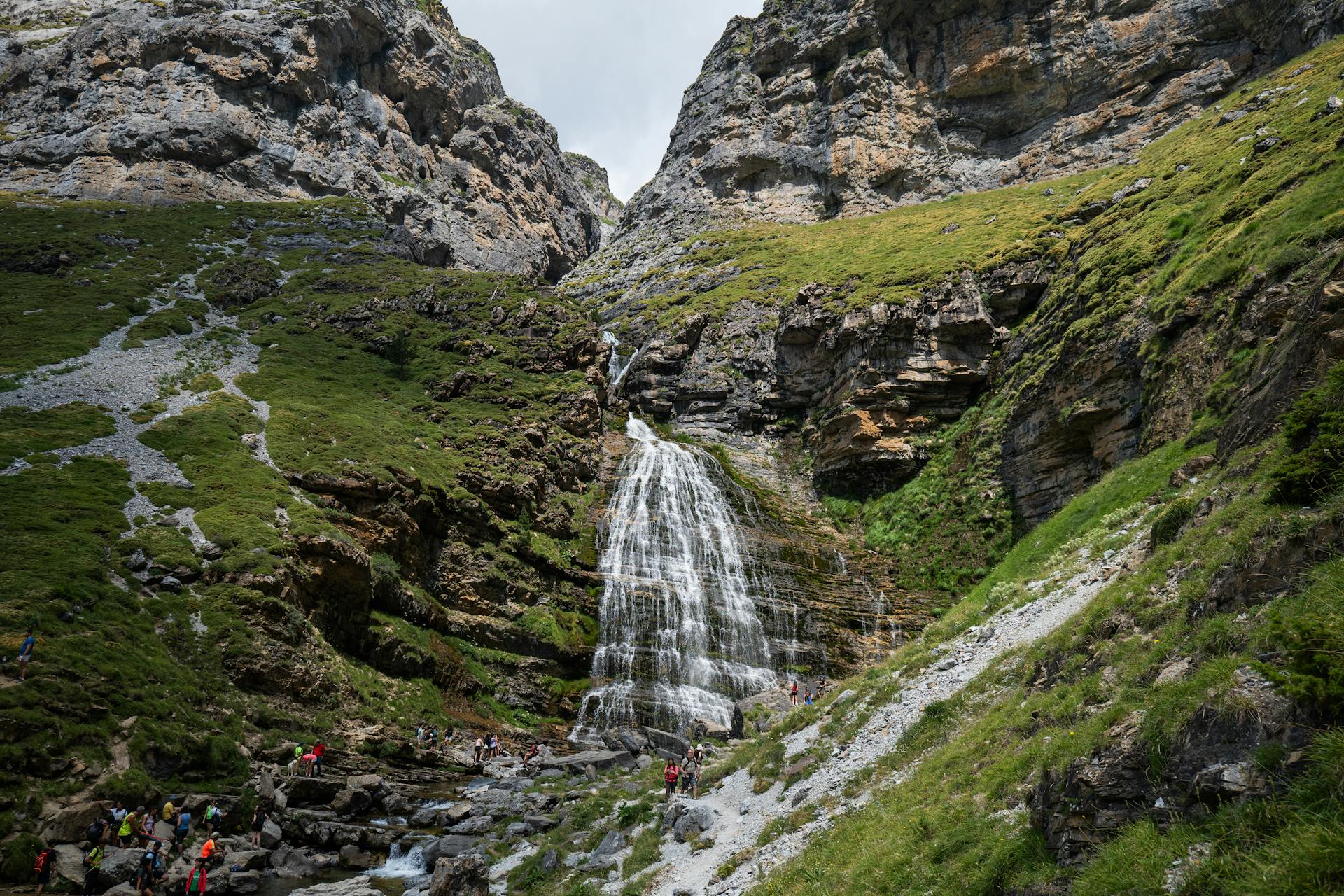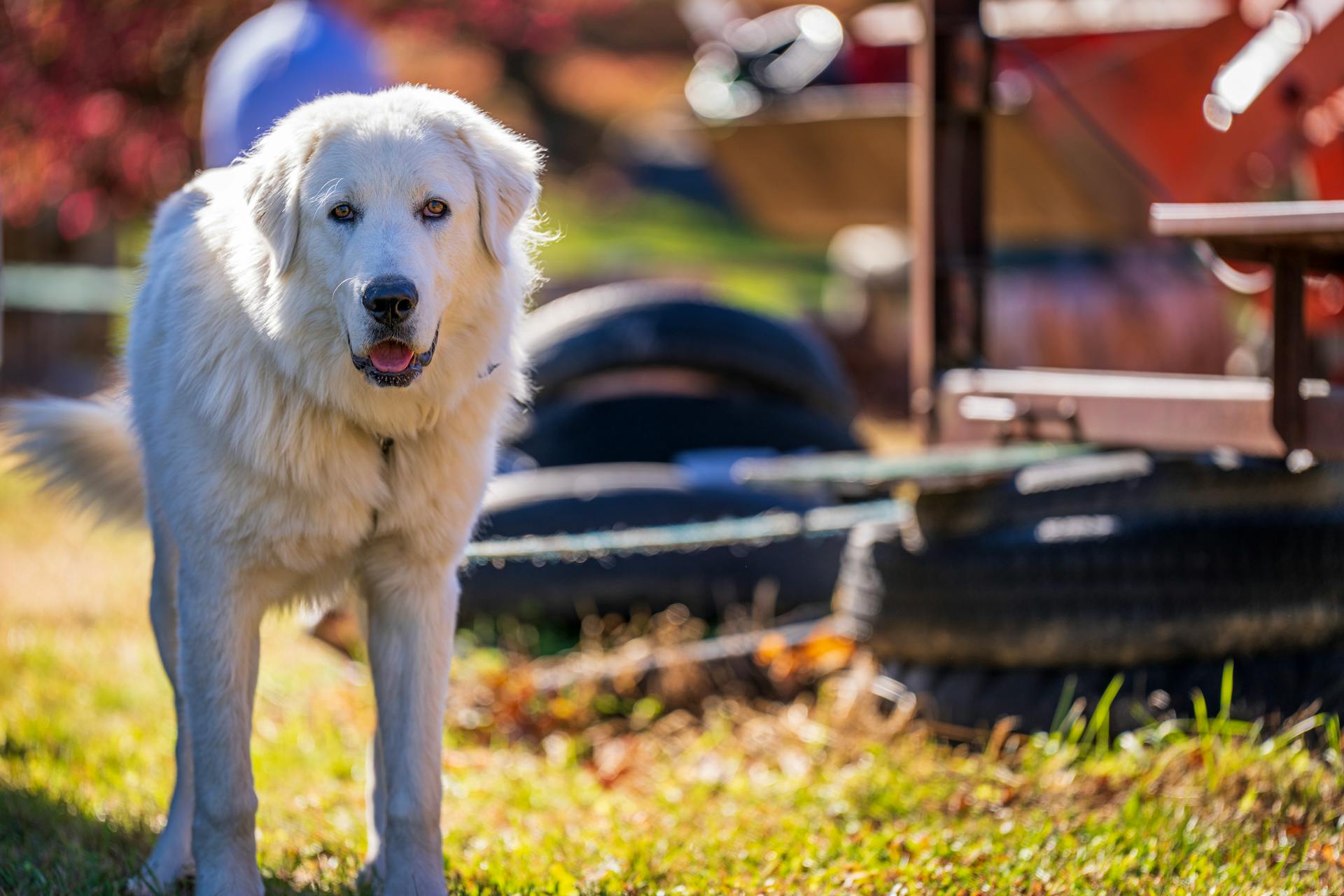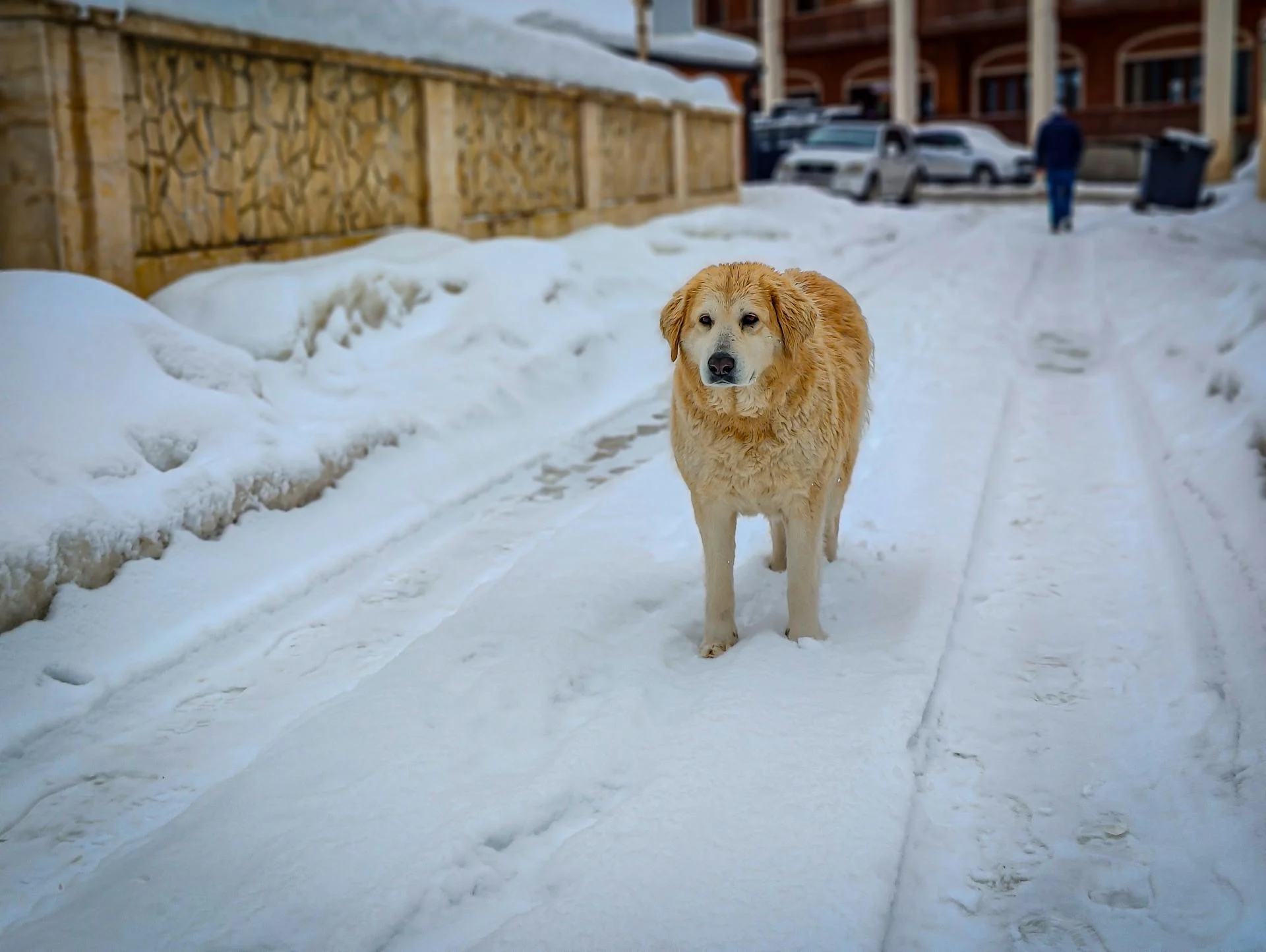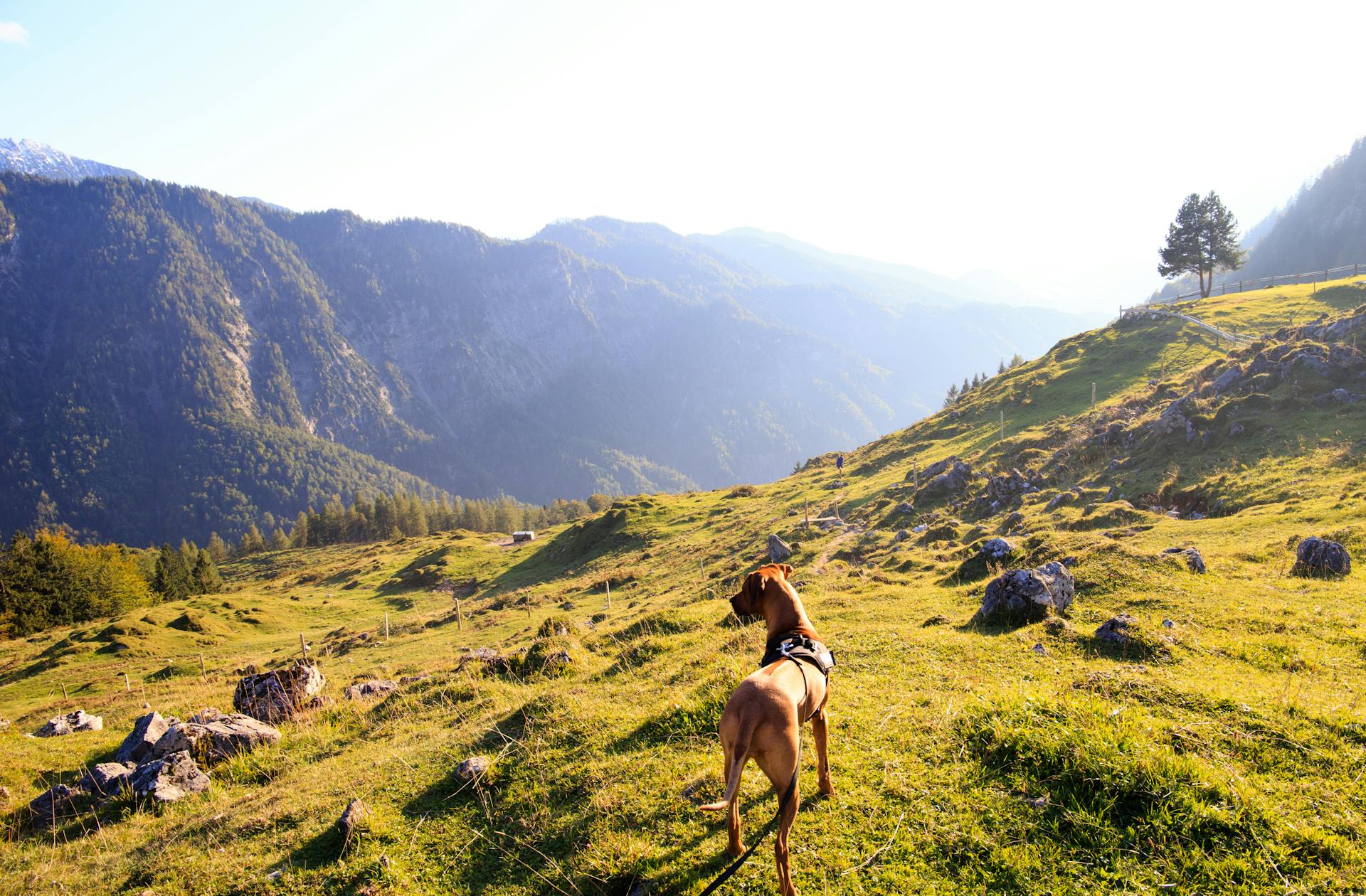
Neutering a Great Pyrenees can be a crucial decision for any dog owner. Neutering can prevent certain health issues, such as prostate problems and testicular cancer.
The ideal time to neuter a Great Pyrenees is between 4 to 9 months of age. This allows the puppy to complete its growth and development before undergoing surgery.
Neutering at a young age can also reduce the risk of certain behaviors, like roaming and aggression. However, it's essential to consider the potential risks, such as increased weight gain and joint issues.
Neutering Considerations
Neutering, or the surgical removal of a male dog's testicles, is a common procedure that can impact a Great Pyrenees' health and development in unique ways.
The timing of neutering can have a significant impact on a Great Pyrenees' health, with some studies suggesting that neutering too early can lead to joint problems like knee injuries and hip dysplasia.
Early neutering may also affect the function of a puppy's growth plates, causing them to grow taller than an intact dog would.
Explore further: Signs of Ivdd in Dachshunds
However, early neutering doesn't stunt growth, and the benefits of neutering, such as preventing problematic behaviors and eliminating the risk of testicular cancer, may outweigh the potential risks.
Some veterinarians recommend delaying neutering for Great Pyrenees until they are closer to physical maturity, which can be around 18 to 24 months.
This is because Great Pyrenees are prone to joint issues, and delaying neutering may help prevent or minimize these problems.
Ultimately, the decision of when to neuter a Great Pyrenees should be made in consultation with a veterinarian familiar with large breeds.
They can provide personalized advice based on the dog's individual health, size, and lifestyle.
Benefits and Drawbacks
Neutering a Great Pyrenees can have both benefits and drawbacks to consider.
Neutering can prevent certain health issues in large breeds, such as testicular cancer.
However, it's essential to weigh these benefits against potential drawbacks, including a higher risk of hip dysplasia.
In some cases, neutering can lead to a decrease in bone density, which may be a concern for a breed prone to joint issues.
Benefits of Early Neutering
Early neutering can reduce aggressive tendencies and roaming behaviors, which is beneficial in managing a large and protective breed like the Great Pyrenees.
All dog breeds can develop problematic behaviors related to their hormonal desire to find a mate, and these issues rarely pose a problem with earlier neutering.
Intact male dogs may have already developed bad habits, such as marking territory, aggression, and wandering away from home, by the time they're neutered later in life.
Neutering eliminates any risk for testicular cancer, and may even reduce the risk for future prostate problems.
Studies point to overall longer lifespans for dogs who get neutered.
Early neutering can prevent unwanted litters of puppies, which is essential, especially with many animal shelters at maximum capacity around the country.
Neutering Disadvantages
Neutering your large breed dog early may lead to joint problems like knee injuries and hip dysplasia if done too early, prior to one year old.
Some veterinarians recommend waiting until your dog is at least 18 months or two years old for certain breeds.
Early neutering may also cause the growth plates to stay open longer, potentially affecting the function of your pup's growth plates.
This can result in your pup growing taller than an intact dog would, although it's not necessarily a health concern.
Early neutering may increase the risk of obesity later in life, but you can counteract this by feeding your pup a balanced diet and ensuring they get plenty of exercise.
Spaying a Great Pyrenees early can potentially increase the risk of orthopedic problems like hip dysplasia and cruciate ligament disease.
The risk of developing mammary tumors increases with each heat cycle the dog goes through, making delayed spaying a disadvantage.
Behavioral and Physical Effects
Early neutering can reduce aggressive tendencies and roaming behaviors, which is beneficial in managing a large and protective breed like the Great Pyrenees.
Delaying neutering can lead to more dominant and territorial behaviors, which can be challenging to manage in a large breed like the Great Pyrenees. Allowing them to mature before neutering can result in these behaviors becoming ingrained.
Neutering before the Great Pyrenees reaches full growth can affect their physical development, potentially leading to a higher risk of joint and bone issues. This is because their growth plates haven't fully closed, making them more susceptible to these problems.
Impact on Growth

Neutering your Great Pyrenees too early can affect their physical development, potentially leading to joint and bone issues.
Allowing your Great Pyrenees to mature before neutering fully ensures their growth plates have closed, reducing the risk of developing joint and bone issues.
Neutering before the Great Pyrenees reaches full growth can affect their physical development, potentially leading to a higher risk of joint and bone issues.
Early neutering may lead to the growth plates staying open longer than they would otherwise, causing your pup to grow taller than an intact dog would.
It's essential to weigh the pros and cons of when to neuter your pup, as no single recommendation works for every large breed dog or owner.
Neutering your Great Pyrenees after they've reached full growth can help achieve full physical maturity, which is particularly important for bone and joint health in large breeds.
Curious to learn more? Check out: What Causes Bone Loss in the Mouth
Behavioral Benefits
Early neutering can reduce aggressive tendencies and roaming behaviors, which is beneficial in managing a large and protective breed.

Intact male dogs will do anything to track down a female dog to mate with, even if it means escaping from your yard and roaming. This can increase their chances of getting hit by a car, encountering or fighting with another animal, or impregnating a female dog.
Neutering eliminates any risk for testicular cancer, and may even reduce the risk for future prostate problems.
If you notice problematic issues in your pup, such as wandering from home, acting out, being aggressive, or marking their territory, talk to your veterinarian about neutering.
You might like: Female Dog Contraception
Veterinary Advice and Care
Most veterinarians recommend spaying female Great Pyrenees between 6 to 9 months of age, ideally before their first heat cycle. This timing is often chosen to prevent the onset of the first heat and to minimize the risk of certain health issues.
For male Great Pyrenees, veterinarians suggest neutering after they have reached puberty, which can have long-term health benefits and help prevent behavioral traits like marking and aggression. This can also reduce the risk of prostate and testicular cancer.
Some veterinarians recommend delaying neutering for Great Pyrenees until they are closer to physical maturity, which can be around 18 to 24 months, due to their large size and potential for joint issues.
Intriguing read: How to Prevent Twisted Stomach in Dogs
Finding a Trustworthy Vet
Finding a trustworthy vet is crucial for your pet's health and well-being. A great veterinarian will offer advice but respect your decisions as a pet owner.
Having a veterinarian close to home can help to eliminate some worry that may arise if your dog gets sick or hurt. You can work to find a caretaker that both you and your dog trust and love.
A licensed veterinarian with experience working with large breed dogs is a good place to start your search. Ask about their opinions regarding neutering dogs of your chosen breed.
You can also take advantage of telemedicine appointments if you prefer. This can be especially helpful if you live in an area with limited veterinary services.
Post-Care for Pyrenees
After a spaying procedure, Great Pyrenees need proper care and monitoring to ensure a smooth recovery. This includes managing pain, which is crucial for their comfort.
Preventing the dog from licking or biting the incision site is also essential to avoid infection. A Great Pyrenees might lick the site due to natural instinct.
A balanced diet is vital for recovery, providing the necessary nutrients for healing. This diet should be maintained throughout the recovery period.
Controlled exercise is also important, helping the dog to stay mobile without putting excessive strain on the incision site.
Alternatives to Traditional
If you're considering alternatives to traditional spaying for your Great Pyrenees, you're not alone. Some owners choose ovary-sparing spay (OSS), where the ovaries are left intact and only the uterus is removed, to maintain hormonal balance while preventing pregnancy.
This option can be beneficial for dog owners who want to preserve their dog's natural hormonal cycle.
Laparoscopic spay is another minimally invasive option that's worth exploring. It's a surgical procedure that uses small incisions and a camera to remove the uterus.
Frequently Asked Questions
What age should a male Great Pyrenees be neutered?
Typically, male Great Pyrenees should be neutered at around 18 months of age, after they have fully grown
Sources
- https://iheartdogs.com/whats-the-best-age-to-neuter-a-male-great-pyrenees/
- https://pennypaws.com/blog/when-to-neuter-a-large-breed-dog/
- https://upnorthpyrenees.com/should-i-spay-or-neuter-my-great-pyrenees/
- https://iheartdogs.com/whats-the-best-age-to-spay-a-female-great-pyrenees/
- https://content.tailster.com/when-should-i-spay-or-neuter-my-great-pyrenees/
Featured Images: pexels.com


